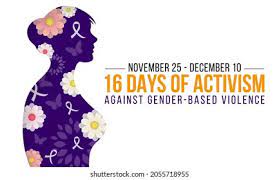Each year, from 25 November to 10 December, the 16 Days of Activism
campaign calls for action against one of the world’s most persistent violations of
human rights – violence against women and girls.
Thursday 25 November 2021 is the International Day for the Elimination of
Violence against Women and marks day one of the 16 Days of Activism. The
period is characterized by 15 more issues that speak to ending gender-based
violence through raising awareness, challenging discriminatory attitudes and
calling for improved laws and services to end violence against women and girls.
The 2021 campaign is themed “Women and girls: Safe at home, online, in the
street, at work and in society as a whole”.
How did the 16 Days of Activism come about?
On 25 November 1960, sisters Patria, Minerva and Maria Teresa Mirabal, three
political activists who actively opposed the cruelty and systematic violence of
the Trujillo dictatorship in the Dominican Republic, were clubbed to death and
dumped at the bottom of a cliff by Trujillo’s secret police.
The Mirabal sisters became symbols of the feminist resistance, and in
commemoration of their deaths, 25 November was declared International Day
for the Elimination of Violence against Women in Latin America in 1980. This
international day was formally recognised by the United Nations in 1999.
In June 1991, the Centre for Women’s Global Leadership (CWGL), alongside
participants of the first Women’s Global Institute on Women, Violence and
Human Rights, called for a global campaign of 16 days of Activism Against
Gender Based Violence.
Why does this matter?
Violence against women continues to occur at an alarming scale in every
country in the world. Too often it is accepted as normal behaviour and the
global culture of discrimination against women allows violence to occur with
impunity. Recent movements such as #MeToo and #TimesUp have propelled
this issue onto the global stage.
Violence against women is a global problem that requires global action. Calls for
action like the 16 days of Activism are crucial because they shine a spotlight on
the issue of violence against women. They are a moment to create public
awareness about what needs to change to prevent it from happening in the first
place at local, national, regional and international levels.
Who needs to be involved?
To end violence against women, we need to challenge the attitudes that
perpetuate, rationalise and normalise it, besides denying women’s right to
safety. Men are overwhelmingly the perpetrators of gender-based violence. To
see violence truly eliminated, the attitudes of men need to change. Shifting
these behaviours is hard and slow, but gender equality means all of us, and
working with all genders is the only way to see true change. Together we must
call on governments, organisations and people everywhere to speak out against
violence.
Violence against women is not inevitable; it is preventable. Tell your families,
schools, communities and workplaces. Together, our message will be amplified,
and our voices heard.
You can support the movement by tweeting #16Days to support human rights
organisations, participating in marches in your cities. Your voice is a critical part
of the global movement to end violence against women.


